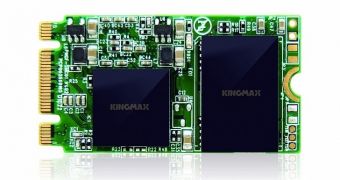The M.2 solid state drive interface has to be the biggest tease of the year, having started things off by promising nearly 2 GB/s performance, only for SSDs based on it to barely ever go above SATA speeds. Kingmax is about to become one of the few providers of truly fast M.2 drives though.
M.2, originally known as the Next-Generation Form Factor, or NGFF for short, comes in two main sizes, the 42 and 80 form factors, commonly known as the 2242 and 2280 specifications. One is short but a bit wider, the other is about the size of one or two of your fingers. They are 55% and 15% smaller than SATA drives, respectively.
The real worth lies in their performance though. When wired through SATA technology, transfer speeds don't go above 600 MB/s. When wired through PCI Express, however, they can go as high as 1.8 GB/s.
This is why we say M.2 drives are a tease actually. One of the first ones to grace out sight came from ADATA (ADATA SR1020NP) and reached 1.8 GB/s. It basically set very high expectations.
Then almost all other M.2 drives that came after only used the SATA configuration, reading and writing files at around 550 MB/s on average. Admittedly, very few motherboards have PCI Express-based M.2 (like ASRock Z97 Extreme 6), so a flood of top-end M.2 drives would have made things awkward, but still.
Anyway, Kingmax seems fully willing to release both SATA- and PCI Express-based M.2 storage devices, in both of the aforementioned form factors.
Unfortunately, the recent press release only mentioned for certain the former, meaning that Kingmax' upcoming M.2 SSDs will stick to SATA speeds. Slower than average ones to boot: 540 MB/s read (which is good) and 300 MB/s write (which is not so good).
We can only hope that the company won't let too many months pass before it provides some of the higher-end solid state storage units.
Not that Kingmax was all that talkative about the ETA for the SATA-based M.2 drives. It only said they were coming, not when. At least the storage capacities were specified: 32 GB, 64 GB, and 128 GB for the 2242 specification, 32 GB, 64 GB, 128 GB, and 256 GB for the 2280.
All drives will have CE, FCC, BSMI, and RoHS certification compliance, meaning they will keep data safe and whole while not taking too heavy a toll on the environment.

 14 DAY TRIAL //
14 DAY TRIAL //